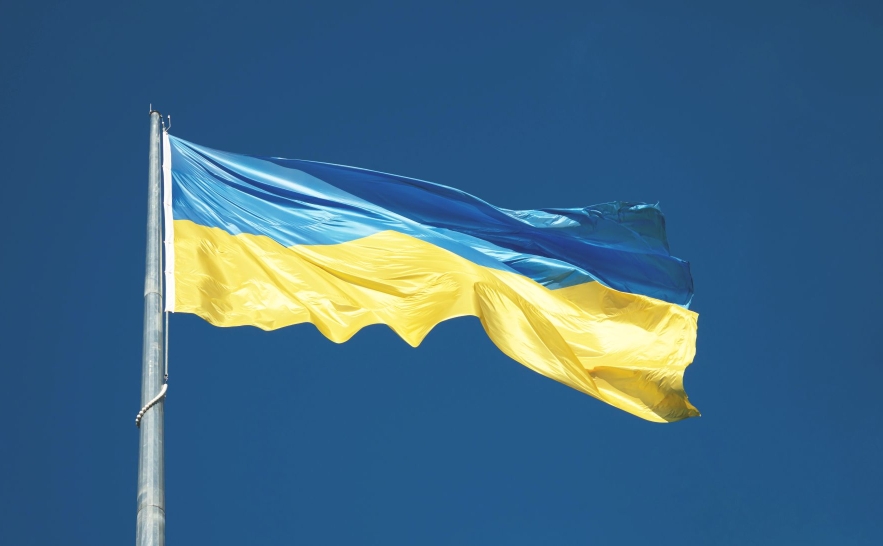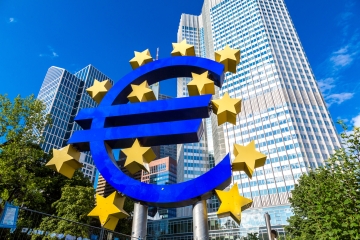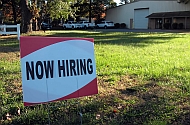
|
|
|

|
|
|
Ukraine
Das IWH unterstützt die
Stellungnahme der Allianz der deutschen Wissenschaftsorganisationen, die den Angriff Russlands auf die Ukraine verurteilt, sich mit den Forschenden in der Ukraine solidarisiert und empfiehlt, die wissenschaftlichen Beziehungen zu Russland einzufrieren. Die Expertise des IWH zur Beurteilung der ökonomischen Folgen des Krieges und der Sanktionen gegen Russland (Energiepreise, SWIFT-Ausschluss, Investitionszurückhaltung)
wird stark nachgefragt. Der Krieg prägt auch die IWH-Frühjahrsprognose
„Preisschock gefährdet Erholung der deutschen Wirtschaft“.
|
|

|
|
|
Lamfalussy Research Fellowship 2021
Isabella Müller
und
Eleonora Sfrappini
wurden von der Europäischen Zentralbank für ihr gemeinsames Forschungsprojekt „Climate Change Regulatory Risks and Bank Lending“ (erscheint in Kürze als
EZB Working Paper) als Lamfalussy Fellows des Jahres 2021 ausgewählt. Das
Lamfalussy Fellowship Programmme
fördert exzellente Forschung zur Struktur, Integration und Leistungsfähigkeit des Europäischen Finanzsystems. Das Stipendium ist mit 10 000 Euro ausgestattet.
|
|

|
|
|
Podcasts
IWH-Vizepräsident
Oliver Holtemöller
sprach im
Wissenschafts-Podcast omega tau
mit Markus Völter über
Modellierung in den Wirtschaftswissenschaften.
Im
MDR-Podcast „Die Wirtschaftsprüfer“
erschienen diese neuen Folgen:
„20 Jahre Euro-Bargeld – eine Bilanz“
(1. Januar 2022),
„Wie sicher ist die Rente?“
(19. Januar),
„Arm trotz Arbeit – Was hilft gegen niedrige Löhne?“
(1. Februar),
„Wirtschaftssanktionen – Kann man Russland damit beeindrucken?“
(15. Februar),
„Wie stark treibt Putin unsere Preise?“
(2. März),
„Krieg statt Klimawende ? Was bleibt vom Aufbruch der Ampel?“
(16. März),
„Wie sehr hängen wir an China?“
(30. März).
|
|


|
|

|
|
|

|
|

|
|
UPCOMING: Donnerstag, 5. und Freitag, 6. Mai 2022, Leopoldina, Halle (Saale)
2nd FINPRO Conference „Finance and Productivity During and After the Lock-Down“
Jointly organised by CompNet, EBRD and IWH, the conference seeks to understand the role of financial systems to channel fiscal and monetary stimulus policies to combat the economic fallout of COVID-19 and how to facilitate a sustainable allocation of economic resources in a post-lockdown world.
Keynote-Speaker:
Thomas Philippon
(Stern School of Business, New York University),
Ufuk Akcigit
(University of Chicago and IWH).
|
|
|

|
|
UPCOMING: Montag, 29. und Dienstag, 30. August 2022, IWH, Halle (Saale)
8th IWH-FIN-FIRE Workshop on „Challenges to Financial Stability“
The IWH is organising a workshop on „Challenges to Financial Stability“ to be held in Halle (Saale). We aim to attract excellent papers that analyse whether and how financial sector regulation changes, the resulting impact on financial stability, and the associated consequences for the real sector.
Keynote Speaker:
Gordon Phillips (Tuck School of Business at Dartmouth).
|
|
|

|
|
UPCOMING: Mittwoch, 14. und Donnerstag, 15. September 2022, EIB, Luxemburg
11th CompNet-EIB-ENRI Annual Conference „Productivity Growth, Climate Change and Digitalization in the Aftermath of the Pandemic Shock“
Slow productivity growth, declining labor shares, inequality, falling investment rates, and declines in business dynamism – these secular trends present challenges to market economies and raise questions about the nature of competition, and the ability of economies to innovate, adjust and respond to the challenges ahead.
|
|
|

|
|
Dienstag, 1. März 2022, IWH, Halle (Saale)
IWH-Transfertagung „Wirtschaft nach Corona – Was tun für den Ausstieg aus dem Krisenmodus?“
Im Rahmen seiner jährlichen Transferkonferenz lud das IWH Vertreter aus Wissenschaft, Politik und Praxis ein, ins Gespräch zu kommen. Im Mittelpunkt standen die Rolle von Insolvenzen als Indikator der Corona-Krise und die Frage nach Rückwegen aus dem ökonomischen Krisenmodus in den marktwirtschaftlichen Wettbewerbsalltag.
Eröffnungsvortrag:
Katja Hessel, MdB.
|
|
|
Alle IWH-Veranstaltungen
|

|
|
|

|
|
|
The Review of Financial Studies
Bank Concentration and Product Market Competition
F. Saidi, Daniel Streitz
>>This paper documents a link between bank concentration and markups in nonfinancial sectors. We exploit concentration-increasing bank mergers and variation in banks' market shares across industries and show that higher credit concentration is associated with higher markups and that high-market-share lenders charge lower loan rates. …<<
|
|

|
|
|
Industrial Relations
Worker Participation in Decision-making, Worker Sorting, and Firm Performance
Steffen Müller, Georg Neuschäffer
>>Worker participation in decision-making is often associated with high-wage and high-productivity firm strategies. Using linked employer–employee data for Germany and worker fixed effects from a two-way fixed-effects model of wages capturing observed and unobserved worker quality, we find that plants with formal worker participation via works councils indeed employ higher quality workers. …<<
|
|

|
|
|
European Journal of Marketing
Executives with Customer Experience and Firm Performance in the B2B Context
Y. Fang, C. Feng, Iftekhar Hasan, J. Sun
>>This paper aims to examine the presence of an executive with customer experience (ECE) in a supplier firm's top management team. The empirical analysis uses a sample of 1,974 firm-year observations with 489 unique supplier firms. The main finding is that ECE presence improves firm performance. …<<
|
|

|
|
|
International Review of Financial Analysis
The Real Impact of Ratings-based Capital Rules on the Finance-Growth Nexus
Iftekhar Hasan, G. Hassan, S.-J. Kim, E. Wu
>>We investigate whether ratings-based capital regulation has affected the finance-growth nexus via a foreign credit channel. Using quarterly data on real GDP growth and cross-border bank lending flows from G-10 to 67 recipient countries, we find that since the implementation of Basel 2, risk weight reductions mapped to sovereign credit rating upgrades have stimulated short-term economic growth in investment grade recipients but hampered growth in non-investment grade recipients. …<<
|
|

|
|
|
International Review of Financial Analysis
Global Equity Offerings and Access to Domestic Loan Market: U.S. Evidence
Iftekhar Hasan, H. Wang, D. Yin, J. Zhang
>>This study examines whether and to what extend global equity offerings at the IPO stage may affect issuing firms' ability to borrow in the domestic debt market. Tracking bank loans taken by U.S. IPO firms in the domestic syndicated loan market, we observe that global equity offering firms experience more favorable loan price than that offered to their domestic counterparts. …<<
|
|

|
|
|
Journal of Banking & Finance
The Nexus Between Loan Portfolio Size and Volatility: Does Bank Capital Regulation Matter?
F. Bremus, Melina Ludolph
>>This paper analyses the effects of bank capital regulation on the link between bank size and volatility. Using bank-level data for 27 advanced economies over the 2000-2014 period, we estimate a power law that relates the volume of a bank's loan portfolio to the volatility of loan growth. Our analysis reveals, first, that more stringent capital regulation weakens the size-volatility nexus. …<<
|
|

|
|
|
Journal of Population Economics
Names and Behavior in a War
S. Jurajda, Dejan Kovač
>>We implement a novel empirical strategy for measuring and studying a strong form of nationalism – the willingness to fight and die in a war for national independence – using name choices corresponding to a previous war leader. Based on data on almost half a million soldiers, we first show that having been given a first name synonymous with the leader(s) of the Croatian state during World War II predicts volunteering for service in the 1991-1995 Croatian war of independence and dying during the conflict. …<<
|
|

|
|
|
Review of Economic Dynamics
Why is Unemployment so Countercyclical?
L. J. Christiano, M. S. Eichenbaum, Mathias Trabandt
>>We argue that wage inertia plays a pivotal role in allowing empirically plausible variants of the standard search and matching model to account for the large countercyclical response of unemployment to shocks. …<<
|
|

|
|
|
Alle IWH-Veröffentlichungen
|

|
|
|

|
|
|
IWH-Diskussionspapiere Nr. 1/2022
The Adverse Effect of Contingent Convertible Bonds on Bank Stability
Melina Ludolph
|
|
|
IWH-Diskussionspapiere Nr. 2/2022
Firm Subsidies, Financial Intermediation, and Bank Risk
Aleksandr Kazakov, Michael Koetter, Mirko Titze, Lena Tonzer
|
|
|
IWH-Diskussionspapiere Nr. 3/2022
Stress-ridden Finance and Growth Losses: Does Financial Development Break the Link?
S. Martínez-Jaramillo, R. Montañez-Enríquez, Matias Ossandon Busch, M. Ramos-Francia, A. Rodríguez-Martínez, J. M. Sánchez-Martínez
|
|
|
IWH-Diskussionspapiere Nr. 4/2022
Banking Deregulation and Consumption of Home Durables
H. Evren Damar, I. Lange, C. McKennie, M. Moro
|
|
|
IWH-Diskussionspapiere Nr. 5/2022
How Does Economic Policy Uncertainty Affect Corporate Debt Maturity?
Xiang Li
|
|
|
IWH-Diskussionspapiere Nr. 6/2022
The Role of State-owned Banks in Crises: Evidence from German Banks During COVID-19
Xiang Li
|
|
|
IWH-Diskussionspapiere Nr. 7/2022
Globalisation, Productivity Growth, and Labour Compensation
C. Dreger, Marius Fourné, Oliver Holtemöller
|
|
|
IWH-Diskussionspapiere Nr. 8/2022
The Effects of Sovereign Risk: A High Frequency Identification Based on News Ticker Data
Ruben Staffa
|
|
|
IWH-Diskussionspapiere Nr. 9/2022
The Impact of Active Aggregate Demand on Utilisation-adjusted TFP
K. Gantert
|
|
|
IWH-Diskussionspapiere Nr. 10/2022
The (Heterogenous) Economic Effects of Private Equity Buyouts
S. J. Davis, J. Haltiwanger, K. Handley, J. Lerner, B. Lipsius, Javier Miranda
|
|
|
IWH-Diskussionspapiere Nr. 11/2022
Exposure to Conflict, Migrations and Long-run Education and Income Inequality: Evidence from Bosnia and Herzegovina
A. Efendic, Dejan Kovač, J. N. Shapiro
|
|
|
IWH-Diskussionspapiere Nr. 12/2022
The Impact of Financial Transaction Taxes on Stock Markets: Short-run Effects, Long-run Effects, and Reallocation of Trading Activity
S. Eichfelder, M. Noack, Felix Noth
|
|
|
Alle IWH-Diskussionspapiere
|

|
|
|

|
|
|
IWH-Pressemitteilung 1/2022
IWH-Insolvenztrend: Keine Insolvenzwelle trotz Omikron
>>Nach historischen Tiefstständen ist die Anzahl der Insolvenzen von Personen- und Kapitalgesellschaften in den vergangenen Monaten leicht gestiegen. Dieser Trend hat sich im Dezember fortgesetzt, und auch die Zahl der betroffenen Jobs ist gestiegen. Für die nächsten beiden Monate ist trotz erwarteter Omikronwelle nicht mit einer Insolvenzwelle zu rechnen. …<<
|
|
|
IWH-Pressemitteilung 2/2022
Investitionen, Auslastungsgrad und öffentliche Finanzen in der mittleren Frist: Implikationen des Zweiten Nachtragshaushalts 2021
>>Die Bundesregierung plant, mit dem Zweiten Nachtragshaushalt 2021 dem Energie- und Klimafonds eine Rücklage in Höhe von 60 Mrd. Euro zuzuführen. Die Mittel sollen auch die gesamtwirtschaftlichen Folgekosten der Pandemie verringern. Nach der Mittelfristprojektion des IWH dürften die beabsichtigten Mehrausgaben auf dem Höhepunkt ihrer Wirksamkeit im Jahr 2024 die Produktion um etwa 0,5% steigern. …<<
|
|
|
IWH-Pressemitteilung 3/2022
IWH-Insolvenztrend: Insolvenzzahlen im Januar im Jahresvergleich nochmals gefallen
>>Nachdem die Anzahl der Insolvenzen von Personen- und Kapitalgesellschaften in den vergangenen Monaten kontinuierlich gestiegen war, zeigt sich im Januar ein Rückgang. Auch die Zahl der betroffenen Jobs ist zurückgegangen. Für die nächsten Monate ist nicht mit einer Insolvenzwelle zu rechnen. …<<
|
|
|
IWH-Pressemitteilung 5/2022
IWH-Insolvenztrend: Insolvenzgeschehen bleibt im Februar ruhig
>>Die Anzahl der Insolvenzen von Personen- und Kapitalgesellschaften liegt im Februar auf dem Niveau des Vorjahresmonats. Die Zahl der betroffenen Jobs ist weiter gering, zeigt die aktuelle Analyse des IWH. Etwaige Auswirkungen des Angriffs Russlands auf die Ukraine werden nicht vor April in den Insolvenzzahlen sichtbar sein. …<<
|
|
|
IWH-Pressemitteilung 6/2022
Konjunktur aktuell: Preisschock gefährdet Erholung der deutschen Wirtschaft
>>Der Ukraine-Krieg Russlands trifft die deutsche Wirtschaft vor allem über einen Energiepreisschock, aber auch über die Unterbrechung von Handelsströmen und über eine allgemeine Verunsicherung. Zugleich erhält die Konjunktur aber von der Aufhebung vieler Pandemie-Restriktionen einen kräftigen Schub. …<<
|
|
|
Alle IWH-Pressemitteilungen
|

|
|
|

|
|
|
 |
|
|
|
Verstorben
Der Gründungspräsident des IWH, Manfred Wegner, verstarb am 19. September 2021 im Alter von 90 Jahren in München. Anfang der 1990er Jahre gelang es ihm, das IWH als neues Wirtschaftsforschungsinstitut in Ostdeutschland zu etablieren. Das IWH wird sich stets mit großer Wertschätzung an ihn erinnern. Wir würdigen seine Verdienste um den Aufbau des Instituts in einem
Nachruf.
|
|

|
|
|
Impressum
Leibniz-Institut für Wirtschaftsforschung Halle
(IWH)
Kleine Märkerstraße 8
D-06108 Halle (Saale)
Tel +49 345 7753 60
www.iwh-halle.de
| Vorstand: |
Vertretungsberechtigter
Vorstand: Professor Reint E. Gropp, Ph.D.,
Professor Dr. Oliver Holtemöller,
Professor Michael Koetter, Ph.D.,
Dr. Tankred Schuhmann, Anschrift wie oben |
| Registergericht: |
Vereinsregister Stendal,
Vereinsregisternummer 21103 |
|
|
|
|